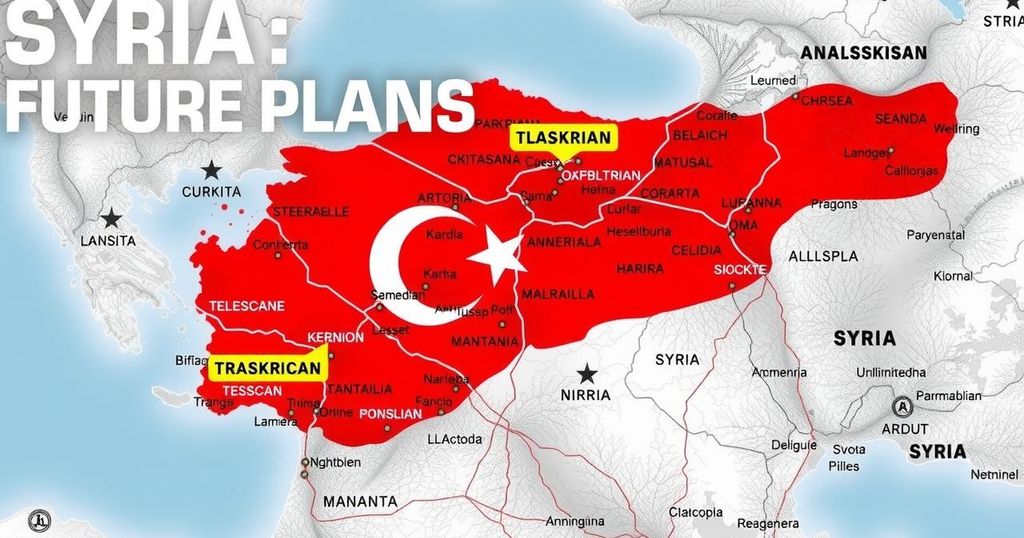World news
AHMED AL - SHARAA, ANKARA, ASIA, ASSAD, BASHAR AL - ASSAD, DONALD TRUMP, EUROPE/ASIA, FIGHTER JETS, HAY ' AT TAHRIR AL - SHAM, HEZBOLLAH, IDLIB, ISRAEL-HAMAS CONFLICT, ME, MIDDLE EAST, MIDDLE EAST AFFAIRS, NATIONAL COALITION FOR SYRIAN REVOLUTIONARY AND OPPOSITION FORCES, NORTH AMERICA, PALESTINE, RUSSIA, SYRIA, SYRIAN, SYRIAN CONFLICT, TURKEY, UNITED STATES, WAR
Jamal Abdullah
0 Comments
Turkey’s Strategic Maneuvers Amidst Shifting Syrian Dynamics
Turkey’s strategic operations in Syria have escalated following the rapid collapse of Assad’s government, unexpectedly positioning Ankara as a dominant force. While aiming to facilitate dialogue among opposition factions, Turkey is also addressing critical issues such as refugee return and post-war reconstruction, all while managing relations with influential groups like HTS and the SDF in the evolving landscape.
The recent rapid collapse of Bashar al-Assad’s regime has caught Turkey somewhat off guard, given the Syrian military’s minimal resistance and Turkish officials’ previous anticipation of Assad’s eventual downfall. However, Turkish authorities did not foresee the swiftness of the regime’s fall. Initially allowing armed opposition groups aligned with Hay’at Tahrir al-Sham (HTS) only limited operations, Turkey was nevertheless unprepared for the swift capture of strategic locations, particularly Aleppo, which significantly enhances Ankara’s position as a dominant force in Syria.
In response to escalating violence in Idlib, Turkey considered a limited military action to secure Tal Rifaat while HTS initiated its offensive. Unexpectedly, this operation expanded into a comprehensive campaign that swiftly overtook several cities within days. Consequently, Turkey has called for constructive dialogue between the Syrian government and the opposition, stressing the importance of preserving Syria’s institutional integrity.
HTS has maintained the existing governmental framework, indicating a desire to preserve state institutions while extending gestures of goodwill toward minorities. Turkey has leverage over HTS, aiming to moderate the group’s approach, showcased by HTS leader Abu Mohammad al-Jolani’s recent initiatives.
Khaled Khoja, the former president of the National Coalition for Syrian Revolutionary and Opposition Forces, remarked on Turkey’s essential influence throughout the operation, stating, “It’s a very sterile revolution, so to say… Turkey’s influence is evident at every step.” Meanwhile, Turkish President Recep Tayyip Erdogan has signalled forthcoming developments that assure Turkey’s southern border security.
Turkey’s ongoing strategy involves reconciling factions within the Syrian opposition and establishing a representative interim government post-Assad. Turkey has demonstrated its governance capabilities in northern Syria, subsequently providing a model for future governance aimed at post-war reconstruction.
Significantly, any forthcoming transitional government will confront issues tied to energy and resource management, particularly in areas dominated by the SDF, which poses challenges for both Turkey and the Assad regime. Experts suggest potential negotiations between HTS and the SDF for resource access, although Turkey emphasizes the need for territorial integrity concerning Arab-majority regions.
The repatriation of Syrian refugees from Turkey also remains a critical focus, with many originating from Aleppo. Initiatives to reestablish logistical connections and economic activity in the region aim to facilitate this process. Nevertheless, the return is anticipated to be gradual, influenced by the overall security environment.
Comprehensive reconstruction of Syria, projected to cost upwards of $360 billion, will require robust international support. Experts emphasize that organizations like the OIC and Gulf nations are poised to play significant roles in reconstruction, with Turkey expected to spearhead these initiatives through its existing non-governmental organization networks and operational strategies in Syria.
The internal conflict in Syria, which has persisted for over a decade, has drawn in multiple regional and global powers, including Turkey. As the nation grapples with spillover impacts such as refugee crises and border security threats, Turkey’s strategic interests have sought to stabilize and influence the opposition in Syria. The recent military successes of opposition forces against Assad’s regime, particularly reflecting on Turkey’s strategic planning, mark crucial turning points in Turkey’s foreign policy in the region.
Turkey’s recent military maneuvers in Syria have solidified its influence in a rapidly changing geopolitical landscape. As the fallout from Assad’s government continues, Turkey’s dual focus on fostering opposition unity and facilitating a transitional governance model underscores its commitment to a stable post-Assad framework in Syria. Efforts toward the repatriation of refugees and reconstruction highlight the multifaceted challenges and opportunities faced by Turkey as it navigates this complex scenario.
Original Source: www.middleeasteye.net




Post Comment